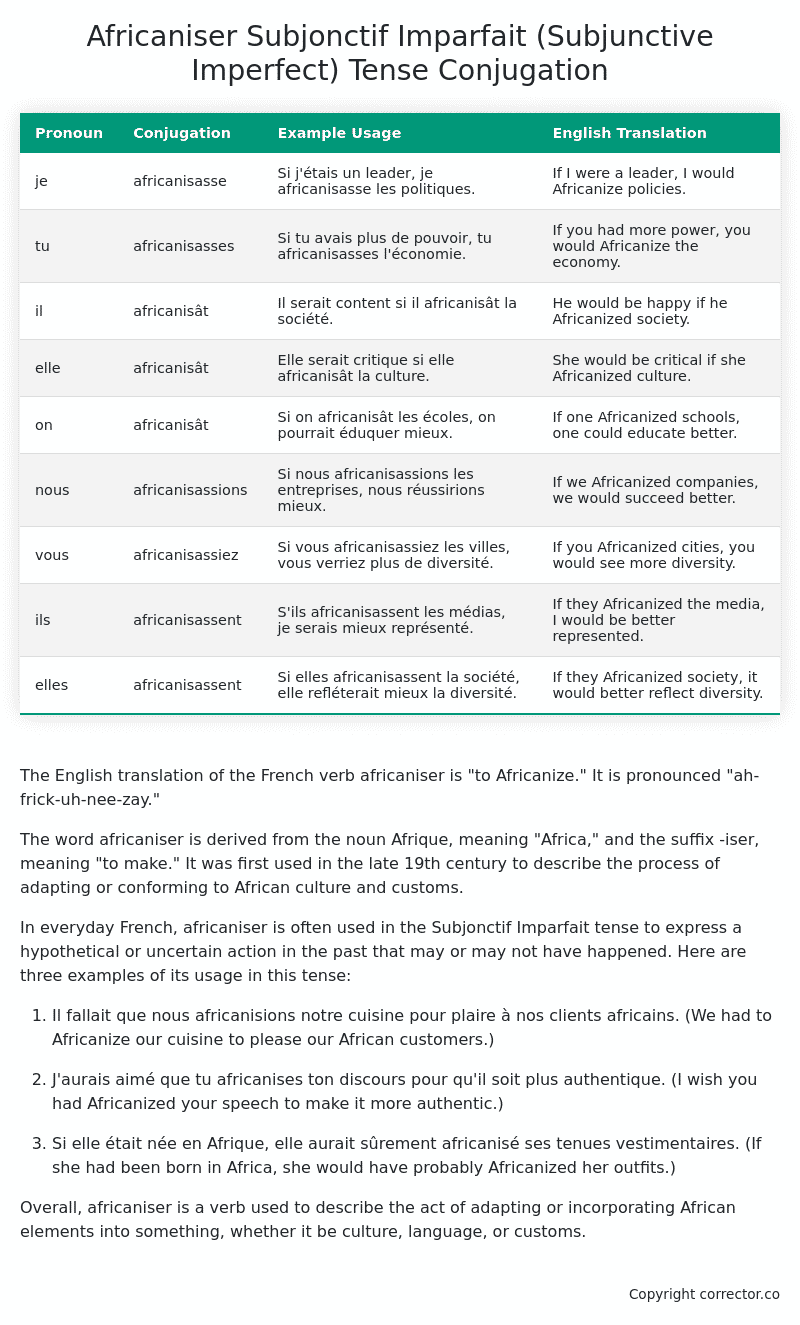Subjonctif Imparfait (Subjunctive Imperfect) Tense Conjugation of the French Verb africaniser
Introduction to the verb africaniser
The English translation of the French verb africaniser is “to Africanize.” It is pronounced “ah-frick-uh-nee-zay.”
The word africaniser is derived from the noun Afrique, meaning “Africa,” and the suffix -iser, meaning “to make.” It was first used in the late 19th century to describe the process of adapting or conforming to African culture and customs.
In everyday French, africaniser is often used in the Subjonctif Imparfait tense to express a hypothetical or uncertain action in the past that may or may not have happened. Here are three examples of its usage in this tense:
-
Il fallait que nous africanisions notre cuisine pour plaire à nos clients africains. (We had to Africanize our cuisine to please our African customers.)
-
J’aurais aimé que tu africanises ton discours pour qu’il soit plus authentique. (I wish you had Africanized your speech to make it more authentic.)
-
Si elle était née en Afrique, elle aurait sûrement africanisé ses tenues vestimentaires. (If she had been born in Africa, she would have probably Africanized her outfits.)
Overall, africaniser is a verb used to describe the act of adapting or incorporating African elements into something, whether it be culture, language, or customs.
Table of the Subjonctif Imparfait (Subjunctive Imperfect) Tense Conjugation of africaniser
| Pronoun | Conjugation | Example Usage | English Translation |
|---|---|---|---|
| je | africanisasse | Si j’étais un leader, je africanisasse les politiques. | If I were a leader, I would Africanize policies. |
| tu | africanisasses | Si tu avais plus de pouvoir, tu africanisasses l’économie. | If you had more power, you would Africanize the economy. |
| il | africanisât | Il serait content si il africanisât la société. | He would be happy if he Africanized society. |
| elle | africanisât | Elle serait critique si elle africanisât la culture. | She would be critical if she Africanized culture. |
| on | africanisât | Si on africanisât les écoles, on pourrait éduquer mieux. | If one Africanized schools, one could educate better. |
| nous | africanisassions | Si nous africanisassions les entreprises, nous réussirions mieux. | If we Africanized companies, we would succeed better. |
| vous | africanisassiez | Si vous africanisassiez les villes, vous verriez plus de diversité. | If you Africanized cities, you would see more diversity. |
| ils | africanisassent | S’ils africanisassent les médias, je serais mieux représenté. | If they Africanized the media, I would be better represented. |
| elles | africanisassent | Si elles africanisassent la société, elle refléterait mieux la diversité. | If they Africanized society, it would better reflect diversity. |
Other Conjugations for Africaniser.
Le Present (Present Tense) Conjugation of the French Verb africaniser
Imparfait (Imperfect) Tense Conjugation of the French Verb africaniser
Passé Simple (Simple Past) Tense Conjugation of the French Verb africaniser
Passé Composé (Present Perfect) Tense Conjugation of the French Verb africaniser
Futur Simple (Simple Future) Tense Conjugation of the French Verb africaniser
Futur Proche (Near Future) Tense Conjugation of the French Verb africaniser
Plus-que-parfait (Pluperfect) Tense Conjugation of the French Verb africaniser
Passé Antérieur (Past Anterior) Tense Conjugation of the French Verb africaniser
Futur Antérieur (Future Anterior) Tense Conjugation of the French Verb africaniser
Subjonctif Présent (Subjunctive Present) Tense Conjugation of the French Verb africaniser
Subjonctif Passé (Subjunctive Past) Tense Conjugation of the French Verb africaniser
Subjonctif Imparfait (Subjunctive Imperfect) Tense Conjugation of the French Verb africaniser (this article)
Conditionnel Présent (Conditional Present) Tense Conjugation of the French Verb africaniser
Conditionnel Passé (Conditional Past) Tense Conjugation of the French Verb africaniser
L’impératif Présent (Imperative Present) Tense Conjugation of the French Verb africaniser
L’infinitif Présent (Infinitive Present) Tense Conjugation of the French Verb africaniser
Struggling with French verbs or the language in general? Why not use our free French Grammar Checker – no registration required!
Get a FREE Download Study Sheet of this Conjugation 🔥
Simply right click the image below, click “save image” and get your free reference for the africaniser Subjonctif Imparfait tense conjugation!

Africaniser – About the French Subjonctif Imparfait (Subjunctive Imperfect) Tense
Formation
Common Everyday Usage Patterns
Interactions with Other Tenses
Subjonctif Présent
Indicatif Passé Composé
Conditional
Conditional Perfect
Summary
I hope you enjoyed this article on the verb africaniser. Still in a learning mood? Check out another TOTALLY random French verb conjugation!


